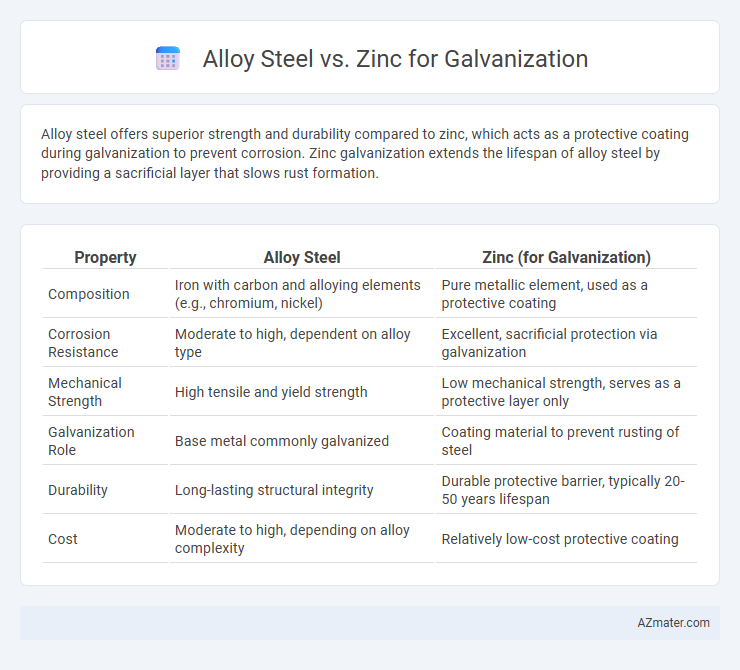Alloy steel offers superior strength and durability compared to zinc, which acts as a protective coating during galvanization to prevent corrosion. Zinc galvanization extends the lifespan of alloy steel by providing a sacrificial layer that slows rust formation.
Table of Comparison
| Property | Alloy Steel | Zinc (for Galvanization) |
|---|---|---|
| Composition | Iron with carbon and alloying elements (e.g., chromium, nickel) | Pure metallic element, used as a protective coating |
| Corrosion Resistance | Moderate to high, dependent on alloy type | Excellent, sacrificial protection via galvanization |
| Mechanical Strength | High tensile and yield strength | Low mechanical strength, serves as a protective layer only |
| Galvanization Role | Base metal commonly galvanized | Coating material to prevent rusting of steel |
| Durability | Long-lasting structural integrity | Durable protective barrier, typically 20-50 years lifespan |
| Cost | Moderate to high, depending on alloy complexity | Relatively low-cost protective coating |
Introduction to Alloy Steel and Zinc Galvanization
Alloy steel, composed of iron combined with elements like chromium, nickel, and molybdenum, offers enhanced mechanical properties and corrosion resistance compared to carbon steel. Zinc galvanization involves coating steel surfaces with a layer of zinc to protect against rust and environmental degradation through sacrificial anode action. The combination of alloy steel's inherent strength and zinc's protective galvanization significantly extends the lifespan and durability of steel products in harsh conditions.
Composition and Properties of Alloy Steel
Alloy steel used in galvanization typically contains elements such as chromium, nickel, and molybdenum, enhancing its strength, corrosion resistance, and toughness compared to plain carbon steel. Its high tensile strength and improved wear resistance make alloy steel ideal for structural applications where durability is critical. In contrast, zinc serves as a protective coating in galvanization, forming a sacrificial layer that prevents rust but does not contribute to the base metal's mechanical properties.
Overview of Zinc and Its Galvanizing Process
Zinc is a corrosion-resistant metal widely used in galvanization to protect steel, including alloy steel, from rust and environmental damage. The galvanizing process involves coating steel with a layer of molten zinc, creating a barrier that prevents moisture and oxygen from reaching the underlying metal. This zinc coating also offers sacrificial protection by corroding preferentially, extending the lifespan of alloy steel structures in harsh environments.
Corrosion Resistance: Alloy Steel vs. Zinc
Alloy steel provides enhanced structural strength but requires a protective coating to resist corrosion effectively, whereas zinc offers excellent corrosion resistance through its sacrificial galvanizing properties. Zinc acts as a barrier and corrodes preferentially, protecting the underlying alloy steel from rust and degradation. The galvanization process significantly extends the lifespan of alloy steel by preventing oxidation, making zinc-coated steel ideal for outdoor and harsh environmental applications.
Mechanical Strength Comparison
Alloy steel exhibits significantly higher mechanical strength compared to zinc, making it ideal for structural applications that require durability and resistance to impact. Zinc, primarily used as a coating in galvanization, provides corrosion protection but has low tensile strength and mechanical robustness on its own. The combination of alloy steel's strength with zinc's protective layer offers enhanced longevity and performance in harsh environments.
Cost Analysis and Economic Considerations
Alloy steel typically incurs higher material costs compared to standard steel, making it more expensive for galvanization processes. Zinc coating adds a protective layer to both materials, but the overall economic benefit depends on the lifespan extension and maintenance savings zinc provides. Cost analysis reveals that while zinc galvanization increases upfront expenses, it significantly reduces total ownership costs by preventing corrosion and minimizing repair expenditures over time.
Applications in Industry and Construction
Alloy steel is favored in industry and construction for its high strength, toughness, and resistance to wear, making it ideal for structural components, heavy machinery, and tools requiring durability. Zinc galvanization protects steel by providing a corrosion-resistant coating, extensively used in roofing, fencing, and outdoor frameworks to prolong lifespan in harsh environmental conditions. Combining alloy steel with zinc galvanization maximizes performance by enhancing mechanical properties while offering superior rust prevention, crucial for infrastructure exposed to moisture and corrosive elements.
Environmental Impact and Sustainability
Alloy steel exhibits higher durability and longer lifespan compared to zinc, reducing the need for frequent replacements and minimizing metal waste in galvanization applications. Zinc offers natural corrosion resistance and is highly recyclable, contributing to a circular economy and lower environmental footprint during the coating process. Sustainable galvanization practices increasingly favor zinc due to its low toxicity and ability to protect steel structures while promoting resource efficiency and soil preservation.
Maintenance Requirements and Longevity
Alloy steel coated with zinc through galvanization offers superior corrosion resistance and requires minimal maintenance due to its durable zinc layer that protects against rust and environmental damage. Zinc galvanization extends the longevity of alloy steel structures by forming a passive zinc oxide layer that self-heals minor scratches, thereby preventing steel exposure and degradation. Compared to bare alloy steel, galvanized components significantly reduce maintenance costs and increase service life, making them ideal for outdoor and industrial applications.
Choosing Between Alloy Steel and Zinc for Galvanization
Choosing between alloy steel and zinc for galvanization hinges on their distinct properties and corrosion resistance. Alloy steel offers superior mechanical strength and durability, making it ideal for structural applications, while zinc provides excellent sacrificial protection against rust through its galvanic properties. Optimizing galvanization involves balancing the enhanced toughness of alloy steel with the cost-effective, long-lasting anticorrosive benefits of zinc coatings.

Infographic: Alloy steel vs Zinc for Galvanization
 azmater.com
azmater.com